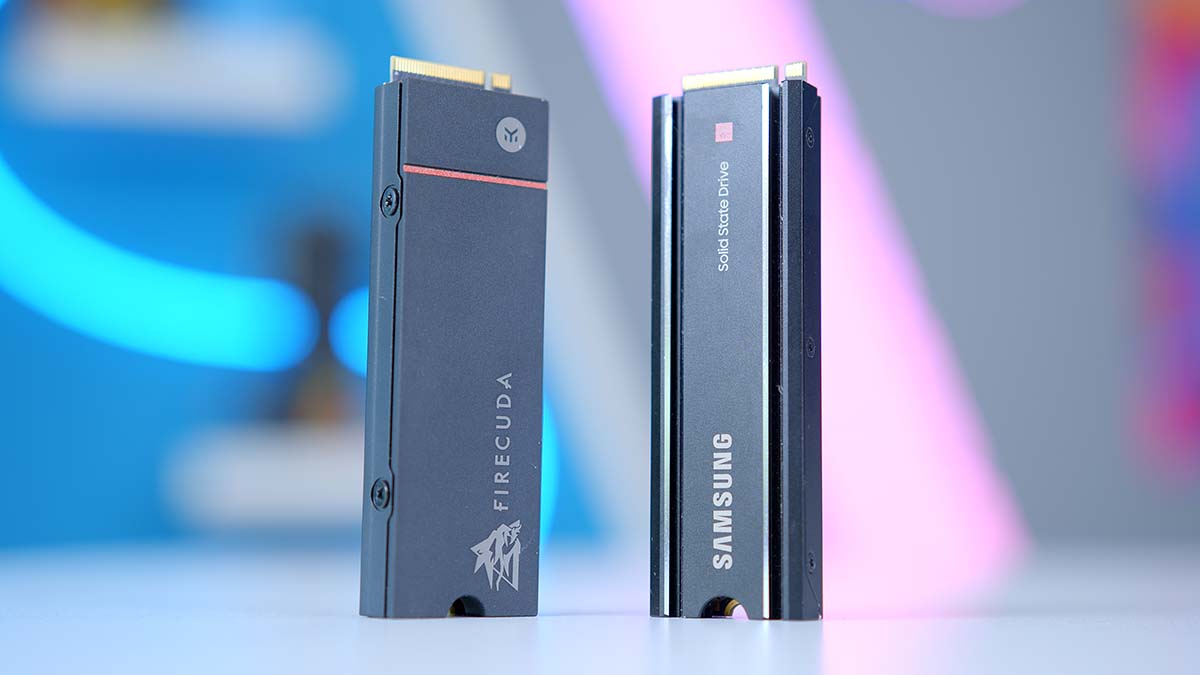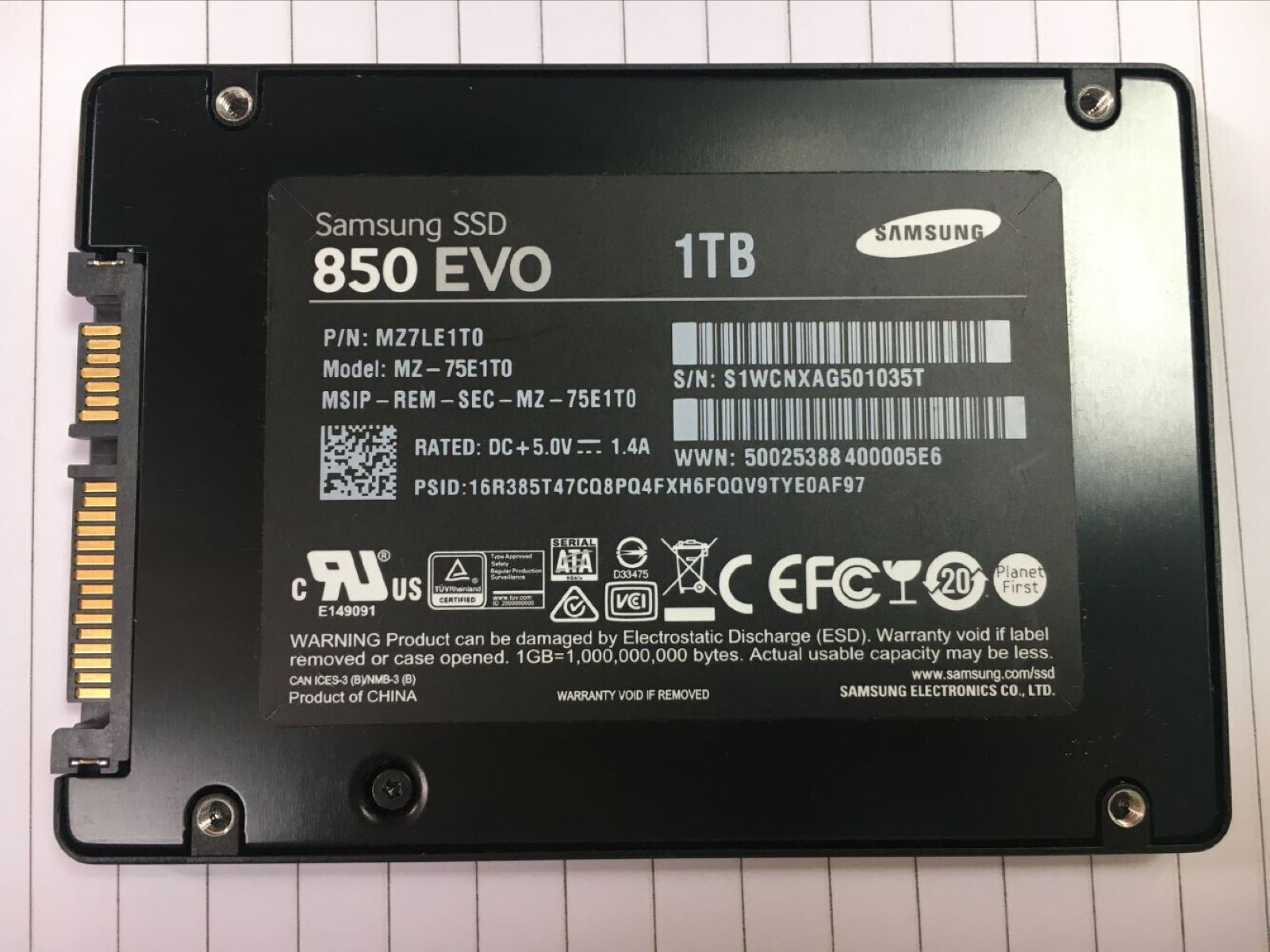Introduction
Technology has progressed at a staggering pace in recent years, revolutionizing the way we store and access data. One such breakthrough in storage technology is the Solid-State Drive (SSD). As computer users continue to demand faster and more reliable storage options, SSDs have become increasingly popular due to their remarkable speed and efficiency.
However, understanding the terminology surrounding SSDs can be challenging, especially for those new to the world of computer hardware. If you’ve come across the term “1TB SSD” and wondered what it means, you’ve come to the right place. In this article, we will delve into the world of SSDs, explore the concept of 1TB storage capacity, and discuss the benefits and drawbacks of using a 1TB SSD.
Before we dive into the specifics, let’s first establish what an SSD actually is. SSDs are storage devices that use flash memory to store data, unlike traditional Hard Disk Drives (HDD) that rely on spinning disks. This fundamental difference in technology allows for significant performance improvements, resulting in faster boot times, quicker file transfers, and smoother overall system operation.
Now that we have a basic understanding of SSDs, let’s explore what the term “1TB” signifies. “1TB” stands for one terabyte, which is a unit of storage capacity. It represents a massive amount of space for storing various types of files, including documents, photos, videos, games, and applications.
A 1TB SSD combines the lightning-fast performance of an SSD with a whopping 1 terabyte of storage space. This larger capacity makes it ideal for users who require ample storage for their digital content and software. Whether you are a professional photographer, video editor, or avid gamer, a 1TB SSD can accommodate all your files and provide instant access to them.
However, it is important to note that while a 1TB SSD offers extensive storage capacity, it may not be necessary for everyone. If you primarily use your computer for everyday tasks such as web browsing, word processing, and casual gaming, a smaller capacity SSD might suffice. It is essential to assess your storage needs and budget before making a purchasing decision.
In the following sections, we will explore the benefits and drawbacks of using a 1TB SSD and help you determine whether it is the right choice for you.
What is SSD?
A Solid-State Drive (SSD) is a type of storage device that has gained widespread popularity in recent years. Unlike traditional Hard Disk Drives (HDDs) that use spinning disks to store data, SSDs utilize flash memory technology. This difference in technology brings about a range of advantages that have made SSDs a preferred choice for many computer users.
The primary advantage of SSDs lies in their speed. Unlike HDDs, which require a mechanical arm to read data from spinning disks, SSDs have no moving parts. This allows them to access and retrieve data significantly faster, resulting in faster boot times, quicker application launches, and smoother overall system performance. The difference in speed is particularly noticeable when performing tasks that involve a large amount of data, such as transferring files or loading games.
Another benefit of SSDs is their durability. Without any moving parts that can wear out over time, SSDs are more resistant to physical shocks and vibrations. This makes them ideal for portable devices such as laptops, where data integrity can be compromised by accidental drops or sudden movements.
In addition to speed and durability, SSDs also consume less power than HDDs. This is because SSDs do not require electricity to spin disks or move mechanical parts. As a result, using an SSD can lead to increased battery life for laptops and a reduction in overall energy consumption for desktop systems.
Overall, SSDs offer a significant performance boost over HDDs and have become a standard feature in many modern computing devices. They effectively address the limitations and bottlenecks associated with traditional storage technologies, benefiting both casual computer users and professionals who require high-speed data access.
As technology continues to evolve, SSDs have become more accessible and affordable. They can now be found in a variety of form factors, ranging from traditional 2.5-inch drives for desktops and laptops to smaller M.2 drives for ultra-thin devices. The increasing availability and affordability of SSDs have made them a viable option for individuals looking to upgrade their storage capabilities.
In the next section, we will explore the concept of 1TB storage capacity and how it relates to SSDs.
What is 1TB?
When it comes to storage capacity, you may have come across the term “1TB” and wondered what it signifies. Let’s delve into the concept of 1TB and understand its relevance in relation to storage devices.
1TB, which stands for one terabyte, is a unit of measurement for storage capacity. It represents a massive amount of space that can be used to store various types of digital content, including documents, photos, videos, games, and applications. To put it in perspective, 1TB is equivalent to 1,000 gigabytes (GB) or approximately one trillion bytes.
In the past, storage capacities were relatively smaller, with 1GB or 1000MB being considered significant. However, as technology advances and digital content becomes more data-intensive, the need for larger storage capacities has arisen. This is where 1TB comes into play.
With a 1TB storage capacity, you can store a vast amount of data. To give you an idea of what this means in practical terms, a 1TB drive can hold around 250,000 photos (assuming an average file size of 4MB per photo), 250 hours of high-definition video, or thousands of hours of music. It provides ample space for storing large files, media libraries, and software applications without the need to constantly manage and delete data to free up space.
1TB drives have become increasingly popular as the demand for more storage has grown. They are commonly used in a variety of devices, including desktop computers, laptops, external hard drives, and gaming consoles. Whether you are a content creator, a professional in need of vast storage for projects, or a multimedia enthusiast, a 1TB drive can accommodate your storage requirements.
It’s important to note that while 1TB is a significant amount of storage, it may not be necessary for everyone. If you primarily use your computer for everyday tasks like web browsing, streaming, and word processing, a smaller capacity drive may suffice. However, if you frequently work with large media files, enjoy downloading and storing a vast collection of movies or games, or require ample space for professional projects, a 1TB drive offers the convenience and flexibility you need.
In the next section, we will explore the concept of a 1TB SSD and what it means to have a combination of high-speed performance and extensive storage capacity.
What does 1TB SSD Mean?
Now that we understand what SSDs and 1TB storage capacity are individually, let’s explore what it means to have a 1TB SSD. A 1TB SSD combines the best of both worlds – the lightning-fast performance of an SSD and a whopping 1 terabyte of storage space.
An SSD, as mentioned earlier, offers significant advantages in terms of speed, durability, and power consumption compared to traditional HDDs. By using flash memory technology, an SSD can access and retrieve data much faster than an HDD, resulting in quicker system boot times, application launches, and file transfers. It revolutionizes the overall user experience by providing a responsive and seamless computing environment.
Now, when we talk about a 1TB SSD, we are referring to a solid-state drive with a storage capacity of 1 terabyte. This means that the drive is capable of storing an enormous amount of data, from documents and multimedia files to software applications and games. With a 1TB SSD, you no longer have to worry about running out of storage space or constantly juggling files to free up room for new ones.
Having a 1TB SSD is particularly advantageous for professionals and enthusiasts who work with large files or require vast storage for their projects. Photographers and videographers, for example, can store their extensive libraries of high-resolution images and videos without compromising on performance. Gamers can keep their ever-expanding game libraries on the SSD for quick and smooth loading times. Creative professionals working with video editing, 3D rendering, or CAD software can benefit from the speed and ample space provided by a 1TB SSD.
Additionally, a 1TB SSD can be an excellent investment for individuals who value convenience and efficiency. It allows you to keep all your essential files, applications, and media in one place, ensuring easy accessibility without the need for external storage solutions. It simplifies the organization of your digital life and eliminates the hassle of managing multiple drives or constantly transferring files between devices.
It’s worth mentioning that a 1TB SSD may not be necessary or practical for everyone. If you have more modest storage needs or are on a tight budget, there are smaller capacity SSDs available that can still provide a significant performance boost compared to traditional HDDs. It’s crucial to assess your storage requirements, budget, and usage patterns before deciding on the appropriate SSD capacity for your needs.
Now that we’ve explored what a 1TB SSD represents, let’s delve into the benefits and drawbacks of using a drive with this storage capacity in the following sections.
Benefits of Using a 1TB SSD
Using a 1TB Solid-State Drive (SSD) offers numerous benefits that greatly enhance your computing experience. Let’s explore some of the advantages of utilizing a 1TB SSD as your primary storage device.
1. Lightning-Fast Performance: One of the most significant advantages of using an SSD is its exceptional speed. With a 1TB SSD, you can experience lightning-fast boot times, near-instant application launches, and quick file transfers. This allows you to work more efficiently, saving valuable time and increasing productivity.
2. Ample Storage Capacity: The 1TB storage capacity of the SSD provides ample space for all your files, documents, multimedia content, and software applications. Whether you are a professional who deals with large media files or an avid gamer with a vast collection of games, a 1TB SSD ensures that you won’t run out of storage space anytime soon.
3. Enhanced System Responsiveness: Due to its superior speed and performance, a 1TB SSD significantly improves overall system responsiveness. Applications launch quickly, and file access is swift, resulting in a smooth and seamless user experience. This is particularly beneficial for resource-intensive tasks such as video editing, 3D rendering, and data analysis.
4. Durability and Reliability: SSDs have no moving parts, which makes them more durable and less prone to mechanical failure than traditional HDDs. This added durability ensures that your data remains safe and accessible, even in case of accidental drops or vibrations.
5. Energy Efficiency: SSDs consume less power than HDDs, leading to increased battery life for laptops and reduced energy consumption for desktop systems. This not only benefits the environment but also allows for a longer-lasting and more efficient computing experience.
6. Noiseless Operation: Without any moving parts, SSDs operate silently, creating a more peaceful and noise-free computing environment. This is especially beneficial for individuals who require a quiet workspace or those using their computer in noise-sensitive environments.
7. Compact Form Factor: SSDs come in various form factors, including smaller M.2 drives, which are ideal for ultra-thin laptops and compact systems. This allows for more flexibility in device design and provides opportunities for sleek and portable computing solutions.
8. Easy Installation and Maintenance: Installing a 1TB SSD is a straightforward process, and most modern computers are compatible with these drives. Additionally, SSDs require minimal maintenance, as they do not defragment like HDDs and do not need periodic disk checks.
By taking advantage of the benefits offered by a 1TB SSD, you can significantly enhance your computer’s performance, storage capacity, and overall user experience. However, it’s important to consider the potential drawbacks of using a 1TB SSD, which we will explore in the next section.
Drawbacks of Using a 1TB SSD
While there are many advantages to using a 1TB Solid-State Drive (SSD), it’s important to consider the potential drawbacks before making a decision. Let’s explore some of the limitations or challenges you may encounter when using a 1TB SSD.
1. Higher Cost: SSDs, especially those with larger capacities like 1TB, can be more expensive compared to traditional Hard Disk Drives (HDDs) of the same capacity. This higher cost per gigabyte may be a deterrent for some individuals, particularly those on a tight budget.
2. Limited Write Endurance: SSDs have a limited number of write cycles compared to HDDs. While modern SSDs have significantly improved in this regard, they can still have a finite lifespan, especially if you consistently perform heavy write operations. However, for typical consumer usage, this limitation is unlikely to be a significant concern during the lifespan of the drive.
3. Future Storage Advancements: Technology is constantly advancing, and new storage technologies may emerge in the future that surpass the capabilities of current SSDs. With rapid developments in the field, it’s possible that larger and more advanced storage options may become available, potentially making your 1TB SSD feel outdated sooner than anticipated.
4. Reduced Storage Efficiency: SSDs require a sufficient percentage of free space for optimal performance. As you approach full capacity on a 1TB SSD, its performance may start to degrade. Therefore, you may need to leave some unused space on the drive to maintain optimal performance levels.
5. Limited Upgrade Options: While SSDs are becoming more common and affordable, upgrading to a larger capacity SSD can still be cost-prohibitive. This means that if you require more storage space in the future, you may need to consider alternative options, such as external storage solutions or cloud-based storage.
6. Compatibility Issues: While SSDs are generally compatible with most modern systems, some older computers may not support the latest SSD technology. It’s important to ensure that your computer’s hardware and firmware are compatible with a 1TB SSD before making a purchase.
7. Reduced Performance as the Drive Fills Up: As a 1TB SSD approaches full capacity, its performance may start to decrease. This is because the drive needs to perform additional operations to find free space and manage data, which can result in slower read and write speeds. However, this performance degradation is generally more pronounced in older SSD models or those with limited over-provisioning.
Considering these drawbacks, it’s essential to weigh them against the benefits of a 1TB SSD and determine if it aligns with your specific needs and budget. It’s also worth noting that SSD technology continues to evolve, and newer models may address some of these limitations.
In the next section, we will help you determine whether a 1TB SSD is the right choice for you by discussing who would benefit most from this storage solution.
Is a 1TB SSD Right for You?
Now that we have explored the benefits and drawbacks of using a 1TB Solid-State Drive (SSD), you may be wondering if it is the right choice for you. Let’s consider who would benefit most from this storage solution.
1. Professionals and Content Creators: If you work with large files or have extensive storage needs, such as photographers, videographers, graphic designers, or architects, a 1TB SSD provides ample space to store your multimedia content, projects, and software applications. It ensures quick access to your files, allowing for seamless workflow and boosting productivity.
2. Gamers and Multimedia Enthusiasts: If you are an avid gamer or have a vast collection of movies and media, a 1TB SSD offers the convenience of storing your entire library on a single drive. This eliminates the need to constantly manage or uninstall games to free up space, while also allowing for faster loading times and smoother gameplay.
3. Professionals with Resource-Intensive Work: If you work with resource-intensive applications like video editing software, 3D rendering, or data analysis tools, a 1TB SSD provides the required storage space and delivers the speed necessary for quick access to large files and efficient data processing.
4. Individuals with Convenience in Mind: If you value convenience and efficiency, a 1TB SSD simplifies your digital life by providing ample storage without the need for external drives or constant data management. It allows for easy organization and accessibility of your files, ensuring a seamless user experience.
5. Those Seeking Performance Improvements: If you want to significantly boost your computer’s speed and overall performance, a 1TB SSD delivers faster boot times, quicker application launches, and improved responsiveness. This is especially beneficial if you find yourself waiting for your system to respond or if you regularly work with multiple programs simultaneously.
It’s important to evaluate your individual needs, storage requirements, and budget before deciding if a 1TB SSD is right for you. If you primarily use your computer for everyday tasks like web browsing, word processing, and streaming, a smaller capacity SSD or even a hybrid storage solution may be sufficient and more cost-effective.
Lastly, consider the future of your storage needs. If you anticipate your data storage requirements to grow significantly over time, it might be worth investing in a larger capacity SSD or exploring other storage options that offer scalability and expandability.
By assessing your specific needs and considering the benefits and drawbacks of a 1TB SSD, you can make an informed decision that aligns with your storage requirements and enhances your computing experience.
Conclusion
The world of storage technology has been transformed by the innovation of Solid-State Drives (SSDs), and the concept of a 1TB SSD has become increasingly relevant in today’s digital landscape. By combining the lightning-fast performance of an SSD with a spacious 1 terabyte of storage capacity, a 1TB SSD offers significant benefits for various users.
We have explored the advantages of using a 1TB SSD, such as its exceptional speed, ample storage capacity, enhanced system responsiveness, durability, energy efficiency, and noiseless operation. These benefits make the 1TB SSD an attractive choice for professionals, content creators, gamers, multimedia enthusiasts, and individuals seeking convenience and performance improvements in their computing experience.
However, it’s important to consider the potential drawbacks of using a 1TB SSD, such as the higher cost compared to traditional Hard Disk Drives (HDDs), limited write endurance, potential future storage advancements, reduced storage efficiency as the drive fills up, limited upgrade options, and compatibility issues.
To determine if a 1TB SSD is right for you, it’s crucial to assess your specific needs, storage requirements, and budget. Consider factors such as the types of tasks you perform, the size of your digital files, and the level of performance improvement you seek. This evaluation will help you make an informed decision about whether a 1TB SSD is the ideal storage solution for your computing needs.
Remember, technology continues to evolve, and new advancements may emerge in the future. It’s important to stay up to date with the latest storage developments and consider future scalability and expandability to meet your evolving storage requirements.
In conclusion, a 1TB SSD offers a powerful combination of high-speed performance and extensive storage capacity. For those who require ample space, improved speed, and enhanced overall system performance, a 1TB SSD can be an excellent investment. However, it’s crucial to carefully evaluate your specific needs and weigh the benefits against the potential drawbacks before making your decision.

























